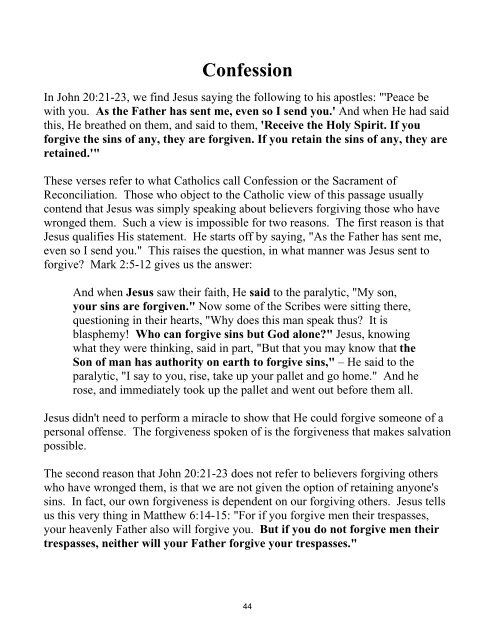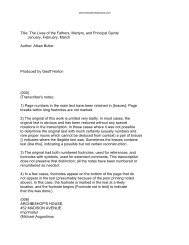Sebastian R. Fama - St. Patrick's Basilica
Sebastian R. Fama - St. Patrick's Basilica
Sebastian R. Fama - St. Patrick's Basilica
Create successful ePaper yourself
Turn your PDF publications into a flip-book with our unique Google optimized e-Paper software.
Confession<br />
In John 20:21-23, we find Jesus saying the following to his apostles: "'Peace be<br />
with you. As the Father has sent me, even so I send you.' And when He had said<br />
this, He breathed on them, and said to them, 'Receive the Holy Spirit. If you<br />
forgive the sins of any, they are forgiven. If you retain the sins of any, they are<br />
retained.'"<br />
These verses refer to what Catholics call Confession or the Sacrament of<br />
Reconciliation. Those who object to the Catholic view of this passage usually<br />
contend that Jesus was simply speaking about believers forgiving those who have<br />
wronged them. Such a view is impossible for two reasons. The first reason is that<br />
Jesus qualifies His statement. He starts off by saying, "As the Father has sent me,<br />
even so I send you." This raises the question, in what manner was Jesus sent to<br />
forgive? Mark 2:5-12 gives us the answer:<br />
And when Jesus saw their faith, He said to the paralytic, "My son,<br />
your sins are forgiven." Now some of the Scribes were sitting there,<br />
questioning in their hearts, "Why does this man speak thus? It is<br />
blasphemy! Who can forgive sins but God alone?" Jesus, knowing<br />
what they were thinking, said in part, "But that you may know that the<br />
Son of man has authority on earth to forgive sins," – He said to the<br />
paralytic, "I say to you, rise, take up your pallet and go home." And he<br />
rose, and immediately took up the pallet and went out before them all.<br />
Jesus didn't need to perform a miracle to show that He could forgive someone of a<br />
personal offense. The forgiveness spoken of is the forgiveness that makes salvation<br />
possible.<br />
The second reason that John 20:21-23 does not refer to believers forgiving others<br />
who have wronged them, is that we are not given the option of retaining anyone's<br />
sins. In fact, our own forgiveness is dependent on our forgiving others. Jesus tells<br />
us this very thing in Matthew 6:14-15: "For if you forgive men their trespasses,<br />
your heavenly Father also will forgive you. But if you do not forgive men their<br />
trespasses, neither will your Father forgive your trespasses."<br />
44






